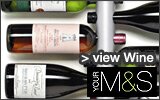This blog post first appeared over on iQ Content’s blog, but seeing as I wrote it and it’s about wine, it’s a good fit for here too.
Using a jobs-to-be-done approach means focusing on the job, rather than on the person doing it.
Needs or “jobs” arise in people’s lives and they “hire” a product or service to get that particular job done.
With Amazon’s re-entry into wine online in the US, Chris Spiek, co-author of an upcoming book on “Jobs to Be Done”, tweeted the following about the job that wine is hired for.

But it seems like many wine #JTBD are in-the-moment/in-the-aisle: Make the dinner I’m preparing tonight a little better.
— Chris Spiek (@chriscbs) September 28, 2012
Being a fan of both wine and the “Jobs to be done” theory, I wanted to think through this to see, if using the JTBD framework, what it might mean for wine retailers.
What job is wine hired for?
The answer of course, is that there are many jobs wine is hired for, but let’s look at two examples.
- Wine is hired to make a dinner better – to flesh out the example from Chris’s tweet above.
- Wine is hired to make the perfect gift.
But just before we get into the jobs to be done, let’s look at how wine is currently sold in most retailers, from small specialist wine shops to the larger supermarkets.

Wine is presented from left to right by country and top to bottom by price. There are some retailers who take a novel approach to merchandising they’re the exception.
But if we look through the lens of the jobs to be done, we can identify how a retailer might differentiate their retail space to make it a little less intimidating when buying a bottle of wine for a specific job (yes, choosing a wine is famously intimidating, but I won’t go into that here).
Hiring wine to make my dinner a little better
So the first job I might hire a bottle of wine for is to match up with the food I’m cooking.
If we’ve identified that as a job you’d hire wine for, then how do we help you get the job done?

Hiring wine as a perfect gift
Then, there’s the wine as a gift, whether it’s to bring along with you to a dinner above, with the added pressure that it’s your wife’s boss and lots of very important people will be there or as a wedding present.
The complication here is that the wine has got to be reassuringly and recognisably expensive (one of the key reasons for massive increase in demand for top growth Bordeaux in China).
It may also need to reflect thoughtfulness, not just price -
“Well, I could have bought you an expensive Tattinger, but this is from a much smaller artisan Champagne house and it’s far better.”
The real job here could be to not look cheap or foolish so how could we make sure our wine gets hired for this more nuanced job?

With this new set of considerations, we’ve started to add content to the shelves – the stories of why, apart from price, you should buy this or that wine as a gift. We’re explaining the attributes that make it most hireable for the job at hand.
As you start to identify more and more jobs that wine is hired for, you could quickly run out of physical space.
However, when you move online, you don’t have this physical constraint, you have the freedom to present the same wines by the different jobs it can be hired for.

But back to Chris’s tweet, most of wine purchases are in the moment (wine to be consumed within 3-4 hours after purchase), which makes it hard for Amazon to be hired. That said, a mere 1% of wine sales in the US are online and those who best identify the jobs wine is hired for are those that will benefit most from the growth opportunities.
More on #JTBD
To backfill on the detail of JTBD, you should watch this four minute video or read this article.
